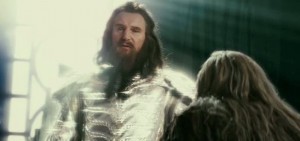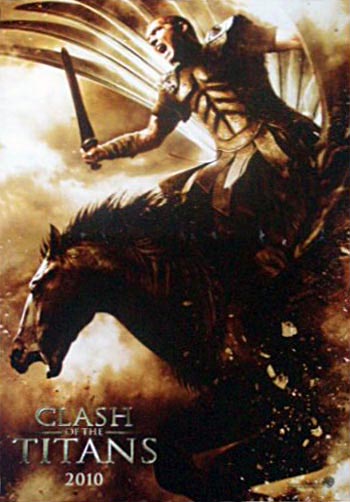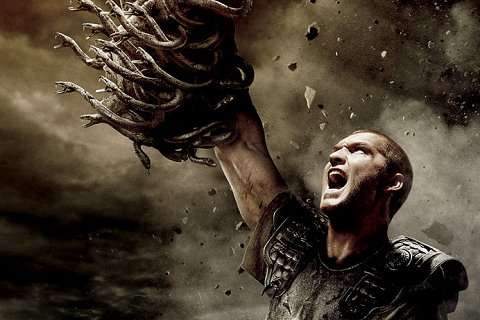Perseus damns the gods (Thank God!)
The gods need US! They need our prayers! – Cassiopeia, Clash of the Titans

I mentioned in the first Clash of the Titans post that we’d address one of the film’s taglines: “damn the gods”. The queen of Argos speaks brazenly about the Greek pantheon of “gods” that rules over them in this remake of the classic 1981 film, prompting Zeus to give the lord of the underworld license to wreak havoc on mankind due to their lack of devotion. I imagine some modern-day Christians are happy with Hades’ response to Cassiopeia – and the city of Argos – assuming her words represents the film’s message, taking a pot-shot at man’s belief in gods – or God – in general. Indeed, as Perseus refuses to pray later in the film, the screenplay may bleed some such sentiments… but the reality is that the “gods” depicted in Clash of the Titans are not worthy of worship, and – if that’s all we really had to look up to – I’d probably side with Perseus.
In this Greco-action flick, as well as Greek myths, the gods of Olympus are created beings: none of them infallible, all-powerful or omnipresent. In fact, we see even the “mighty Zeus“ as capricious, obviously not all-knowing, and (as Cassiopeia attests) his immortality is contingent, sustained by the prayers of his followers. As we see Zeus transform into an eagle, it becomes clear that the “gods” of the movie and mythology are precisely the type the apostle Paul warns that mankind so often fabricates:
 “they became fools, and exchanged the glory of the immortal God for images resembling mortal man and birds…” – Romans 1
“they became fools, and exchanged the glory of the immortal God for images resembling mortal man and birds…” – Romans 1
What’s curiously current about this is that MODERN thoughts and myths about God are steering much the same direction. From popular fiction like Neil Gaiman‘s American Gods to Oprah style pop-god mentality and – sadly – loosely-labeled Christianity, the notion that God (or gods) exist and are sustained by the belief of their followers is entertained commonly. “What if god was one of us?” What if he’s trying to figure life out much like we are? This notion seems to be the “god” we currently WANT. This begs the question: if we’re enamored with this idea, why does Clash of the Titans depict these fallible gods as someone our protagonist and his band of warriors rail against?
While “the god who needs us” ignorantly makes us feel empowered and useful in a symbiotic way with our creator, it lowers “god” in such a way that he/she/it really isn’t “God” at all. What truly informed comfort or care comes from something equally contingent on us, fallible but more powerful, that we can manipulate in a fashion… and, upon our lack of faith, might lash out at us based on need instead of offering loving correction as a father? Upon introspection, this modern image of “god” is nothing new or better than the Greek cyphers Perseus growls at in the film. I’m glad the new Clash depicts THIS notion of god(s) as beneath our worship and respect.
One day, somebody’s got to make a stand. One day, somebody’s got to say enough… – Spyros, Clash of the Titans
Perseus’ adoptive father suggests someone needs to stand up against these “gods”, and it got me thinking; that’s precisely what the apostle Paul did when he traipsed into Greek culture in 1st century history. He used words instead of swords, and essentially preached against the needy, capricious gods of Greek myth. In the movie, Zeus is credited with creating mankind (paralleling Greek writing and poetry). Paul pillaged that poetry and agreed we are God’s “offspring” – that He gives us breath – but stressed that the true God was unknown to them:
The God who made the world and everything in it, being Lord of heaven and earth, does not live in temples made by man, nor is he served by human hands, as though he needed anything, since he himself gives to all mankind life and breath and everything. – apostle Paul, Acts 17
 Instead of offering a temporary respite like Perseus does in the film’s clash, using a titan to turn enemies into stone, Paul held up a metaphorical mirror to reveal that their gods simply WERE stone, and their true hope could fly higher. Christians could easily whine about “anti-God” sentiments in this film, but I’m challenged by the ability to use this movie as a springboard much as Paul used myth. God doesn’t need us, he CHOOSES to love us. He doesn’t look like a bird, or Liam Neeson:
Instead of offering a temporary respite like Perseus does in the film’s clash, using a titan to turn enemies into stone, Paul held up a metaphorical mirror to reveal that their gods simply WERE stone, and their true hope could fly higher. Christians could easily whine about “anti-God” sentiments in this film, but I’m challenged by the ability to use this movie as a springboard much as Paul used myth. God doesn’t need us, he CHOOSES to love us. He doesn’t look like a bird, or Liam Neeson:
Remember this and stand firm, recall it to mind, you transgressors, remember the former things of old; for I am God, and there is no other; I am God, and there is none like me, declaring the end from the beginning and from ancient times things not yet done, saying, ‘My counsel shall stand, and I will accomplish all my purpose’ – prophet Isaiah, Isaiah 46:9
Thank God the weak god-like apparitions in classical mythology and our modern musing of a contingent deity can truly be damned… that we have a God who is wholly other, who holds securely the great epic that encompasses all our lives. Thank God He also sends a Savior who looks a lot better than Perseus, or a mono-emotion Sam Worthington (but we’ll look at that in the next post).



“Christians could easily whine about “anti-God” sentiments in this film, but I’m challenged by the ability to use this movie as a springboard much as Paul used myth.”
You know what I hate about you James? When the HS uses you to convict me.
A another nice analytical piece. Things that I noticed but many things I missed – in particular the link to having a similar argument in acts against the Olympiads (and all “gods”).